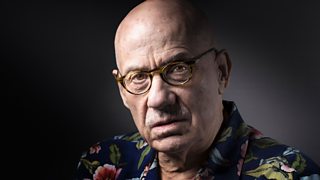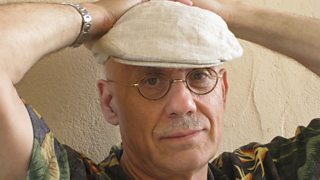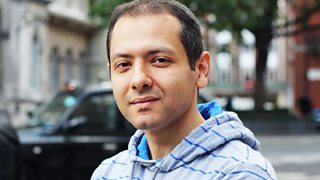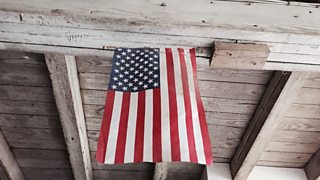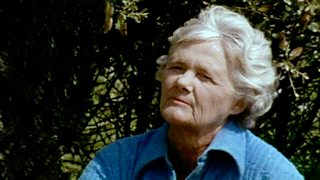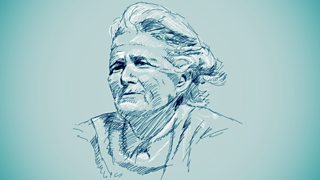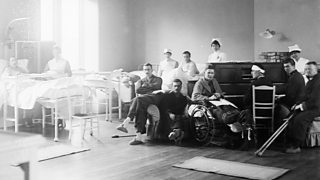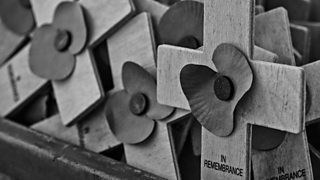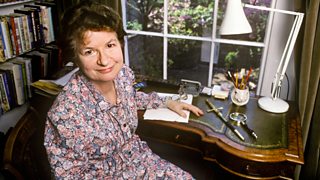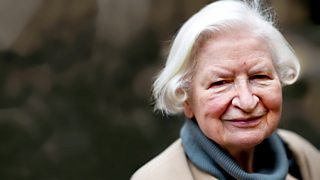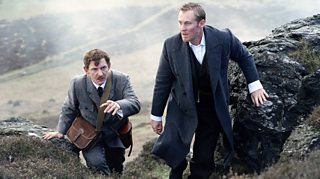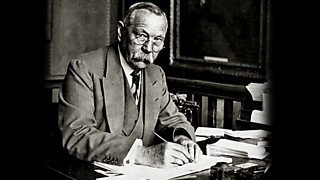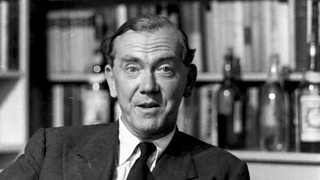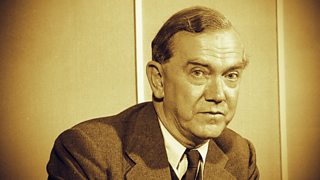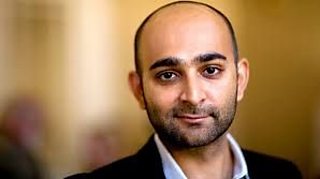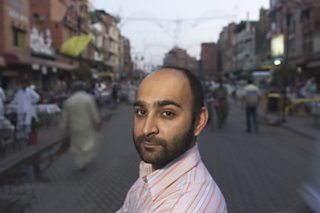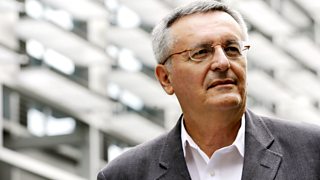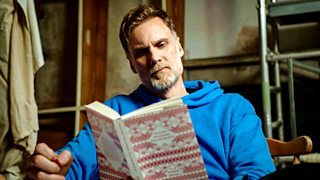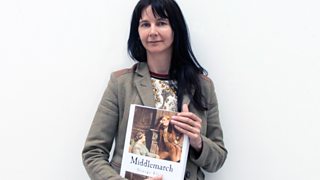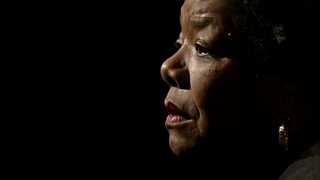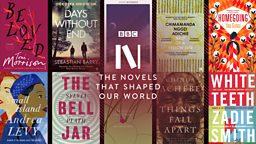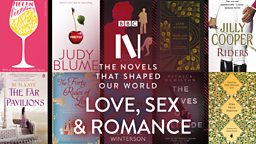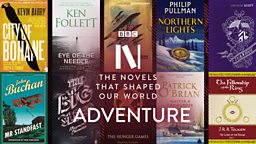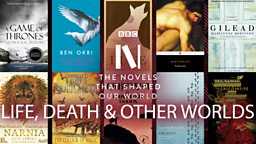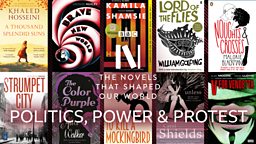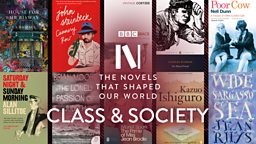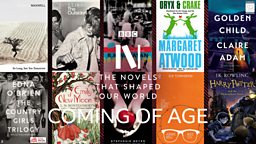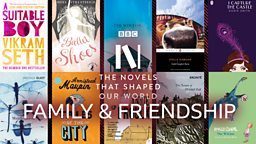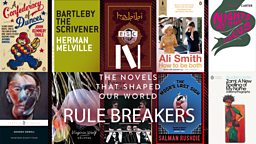Crime & Conflict: Ten novels about the best and worst of humanity
The impact of war, violence, crime and struggle unite these ten novels. From Bapsi Sidhwa's exploration of partition in Ice Candy Man, to the second civil war of Omar El Akkad's American War, and Holmes and Watson's fight against the seemingly supernatural in The Hound of the Baskervilles.
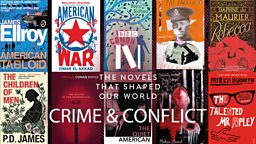
The panel have chosen these novels on the theme of Crime & Conflict:
American Tabloid by James Ellroy; American War by Omar El Akkad; Ice Candy Man by Bapsi Sidhwa; Rebecca by Daphne du Maurier; Regeneration by Pat Barker; The Children of Men by P.D. James; The Hound of the Baskervilles by Arthur Conan Doyle; The Quiet American by Graham Greene; The Reluctant Fundamentalist by Mohsin Hamid; The Talented Mr Ripley by Patricia Highsmith.
The Novels Survey
-
![]()
Contribute to a people's list of best-loved crime and conflict stories and get personalised book recommendations.

American Tabloid by James Ellroy, 1995
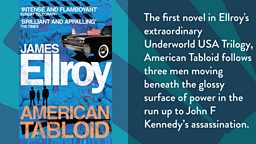
American Tabloid, James Ellroy’s historical novel by way of conspiracy thriller, opens a door into a criminal underworld of spies, mobsters, politicians and hit men in the lead-up to John F Kennedy’s election and assassination. This vibrant and often unsettling page-turner forces the reader to question what they thought they knew about the murky world of American politics, and how deep conspiracies actually go.
Book Club Questions
1. How does the novel blur the lines between morality and immorality – did you find yourself rooting for any character in this group of anti-heroes?
2. To what extent does Ellroy’s minimalist, clipped writing style complement the narrative and feel of the novel?
3. Ellroy’s work has been criticised for its casual use of sexist and racist invectives. Did this affect your reading of the book?
-
![]()
LISTEN: Renegade Writing - James Ellroy on American Tabloid
Ellroy reads from American Tabloid, which exposes the underbelly of a country on the threshold of Kennedy's golden age.
-
![]()
LISTEN: 'The American Dostoevsky'
Philip Dodd in conversation with James Ellroy about his 'brilliant and appalling' novel exploring the rot at the heart of America.
Get Involved

American War by Omar El Akkad, 2017
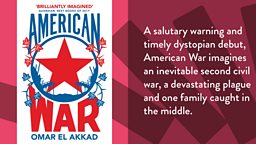
Born in the latter half of the 21st century, into an America hugely changed by environmental disaster and a second civil war, Sarat Chestnut arrives in a refugee camp at the age of six. Informed by the author’s experiences as a war correspondent, the novel follows the influence of the camp on Sarat’s life, her radicalisation and its terrifying consequences.
Book Club Questions
1. How similar are the events of the second American Civil War to the first, and how likely is it that something similar could arise again in our time?
2. How does the novel portray the concept of ‘home’? And what determines whether a character feels at home in any particular situation?
3. At the end of the prologue, the narrator says, ‘This isn’t a story about war. It’s about ruin.’ To what extent do you agree with that statement?
-
![]()
LISTEN: Omar El Akkad on his vision of a future America
Omar El Akkad talks to Mariella Frostrup about his dystopian vision in which a second Civil War breaks out in America over fossil fuels.
-
![]()
LISTEN: Climate change, civil war and an America set apart from the rest of the world
The Cultural Frontline looks at Omar El Akkad's award-winning novel American War.
Get Involved

Ice Candy Man by Bapsi Sidhwa, 1988
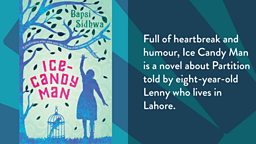
View the Partition of India and Pakistan through the eyes of Lenny – a young girl living with polio – and how the conflict and sectarian violence affects her family and her community. The story starts under British rule, following Lenny and Ayah spending their days in the park amongst Ayah’s many admirers. Although non-biographical, the author was born to Parsee parents in Karachi, she contracted polio aged two, and grew up in Lahore during the Partition.
Book Club Questions
1. What do you think about the relationships Lenny has with the different members of her family including Ayah and Godmother?
2. What are your thoughts of the Ice-Candy Man and his character throughout the book?
3. How does the Partition affect the different characters in the story and how do you feel at the end of the book?
Get Involved

Rebecca by Daphne du Maurier, 1938
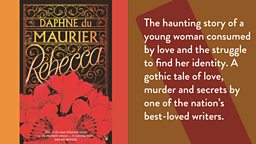
An unnamed young woman, the central character in Rebecca, is destined to live as maid to an overbearing mistress, until a chance meeting with the dashing widower Mr de Winter leads to a new life as lady of a vast country home. But life at Manderley will not be easy, and the ghost of the former Mrs de Winter – Rebecca – casts a shadow over everything.
Book Club Questions
1. How does du Maurier use language, setting and imagery to build the oppressive psychological tension of the story?
2. In what ways does Rebecca interrogate the roles and expectations of women in society at the time through its female characters?
3. How does the novel challenge our thoughts on criminality and justice? Do the characters get the ending they deserve?
-
![]()
WATCH: The inner world of Daphne du Maurier
In her first television interview, shown in 1971, Daphne du Maurier reflects on her life and inspiration.
-
![]()
LISTEN: Rebecca at the Daphne du Maurier literary festival in Cornwall
Sally Beauman, author of Rebecca's Tale, joins James Naughtie and a Bookclub audience in Fowey to discuss Rebecca.
Get Involved

Regeneration by Pat Barker, 1991
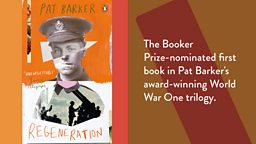
Regeneration is a blend of history and fiction that follows the recovery of a group of men, including Siegfried Sassoon and Wilfred Owen, in a military hospital for officers diagnosed with shell shock during the latter years of World War One. While Rivers, one of the hospital’s psychiatrists, helps the men confront the horrors they experienced and cope with their trauma, he does so in the knowledge that his success will result in sending them back to the front.
Book Club Questions
1. Would you consider Regeneration an anti-war novel? Why or why not?
2. How does Barker portray poetry as a way of expressing experience and processing trauma?
3. How did you feel about the conflict inherent in Rivers’ role to help his patients become well enough to deal with their trauma, only to send them back to war?
-
![]()
LISTEN: A Modern War Classic
Pat Barker answers questions on her part-historical, part-fictional exploration of the psychiatric treatment of World War One soldiers at a hospital in Scotland.
-
![]()
LISTEN: Responses to War - Owen Sheers and Pat Barker
Booker Prize winner Pat Barker and poet Owen Sheers discuss the responses of writers, musicians and painters to war.
Get Involved

The Children of Men by P. D. James, 1992
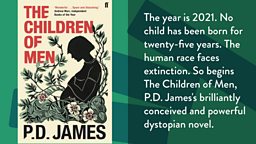
Set in a dystopian 2021, where no children have been born for 25 years, the human race is facing extinction. England is under the rule of the Warden and his small council, who are implementing unforgiving and ominous policies to shape how the remaining humans will live out the rest of their lives. Theo Faren, a once close and now estranged cousin of the Warden, is trying to quietly get through life as an Oxford historian until he is caught up in secrets and plans that see him starting a journey that will change the future of mankind.
Book Club Questions
1. The Children of Men was published in 1992 but is set in 2021. Do you see any parallels with our own society?
2. If you were in the Warden’s position, how would you run this ageing population facing despair and extinction?
3. What do you think is the main message of the book?
-
![]()
READ: Born to write - PD James's 10 tips for writing novels
In 2013, at the age of 93, celebrated crime writer PD James wrote for 91热爆 News about her top 10 tips for being an author.
-
![]()
LISTEN: PD James at the 91热爆
A series of 91热爆 archive highlights looking at at the life and career of PD James.
Get Involved

The Hound of the Baskervilles by Arthur Conan Doyle, 1902
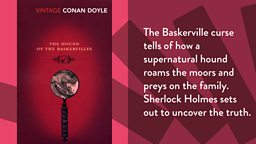
The Hound of the Baskervilles is the first appearance of Sherlock Holmes since his apparent death. Set largely on Dartmoor in Devon, the novel tells the story of a mysterious death due to a legendary deadly hound that is targeting the Baskerville family. Holmes and his companion Dr. Watson investigate the case to see whether the supernatural hound is the real killer.
Book Club Questions
1. Eight years after Conan Doyle had ‘killed’ Sherlock Holmes, he was inspired by the tales of ghostly hounds that roamed Dartmoor to write another novel. How does the setting enhance the story?
2. Sherlock Holmes and Dr. Watson are a famous literary pairing. Would The Hound of the Baskervilles be different if Watson were taken out of the tale?
3. A strong sense of the natural and supernatural is in play surrounding the Baskerville mystery. How, or what, does this add to the novel?
-
![]()
WATCH: Richard Roxburgh's Holmes and Ian Hart's Watson in Hound of the Baskervilles
Clips from the 91热爆's 2002 production of Conan Doyle鈥檚 Hound of the Baskervilles.
-
![]()
LISTEN: Gyles Brandreth on Sir Arthur Conan Doyle
Gyles Brandreth praises the life of Arthur Conan Doyle, the creator of Sherlock Holmes, on Radio 4's Great Lives.
Get Involved

The Quiet American by Graham Greene, 1955
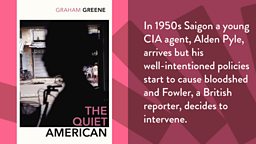
The Quiet American follows Thomas Fowler, a cynical British journalist, and Alden Pyle, an idealistic young CIA agent, over several years in 1950s Vietnam. Jumping back and forth in time, Fowler observes Pyle’s desires to replace waning French colonialism with an American ‘Third Force’.
Book Club Questions
1. Did you find Phuong to be a fully fleshed out character in the novel? How does her depiction compare to that of Vietnam?
2. How are personal and political motivations paralleled in the novel?
3. What is the danger of innocence in The Quiet American?
-
![]()
LISTEN: Master of Plot - Open Book's Graham Greene Special
Louise Doughty, Lawrence Osborne and Dr Jon Wise discuss the mastery of Graham Greene, while Peter James goes in search of his iconic Brighton locations.
-
![]()
LISTEN: Our Man in Greeneland: The Third Man
Correspondent Bethany Bell explores Graham Greene's time in post-war Vienna, and the writing and making of The Third Man in the late 1940s.
Get Involved

The Reluctant Fundamentalist by Mohsin Hamid, 2007
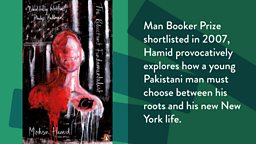
In a cafe in Lahore, Pakistan, a man named Changez pulls up a seat at a table occupied by an American man and begins to relay his story. As his tale unfolds, we hear of his migration to America and the events that led him away from the West and back to Pakistan.
Book Club Questions
1. The book is written in the second person, with Changez telling his story to the American from whom we never hear a response. What is the impact and significance of this?
2. The novel explores the aftermath of the 9/11 attacks in the US. How does the tragedy affect Changez's life in America and in what ways does he experience conflict as a result?
3. The 9/11 attacks were one of the biggest historical events in living memory with long lasting reverberations for the Middle East and the West. How does Changez's narrative give a different perspective of the conflict, and challenge our ideas of criminality and justice?
-
![]()
LISTEN: Mohsin Hamid on The Reluctant Fundamentalist
James Naughtie and Mohsin Hamid discuss this sparse, gripping, short novel that tackles the complex issues of Islamic fundamentalism and America's 'war on terror', and the book's ambiguous ending.
-
![]()
LISTEN: Is Hamid holding up a mirror to the reader?
From an interview in 2009, Mohsin Hamid reads from his book and offers insight about his novel to Harriett Gilbert and the World Book Club audience.
Get Involved

The Talented Mr Ripley by Patricia Highsmith, 1955
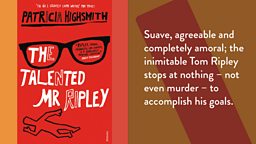
When Tom Ripley, a loser, is mis-recognised by Dickie Greengate’s father as an old classmate of his son, a trust-fund playboy living a life of wealth, ease and profligacy in Italy, a tragic sequence of events is triggered. What follows is a psychological thriller of obsession, greed, murder and identity theft across the playgrounds of Europe.
Book Club Questions
1. The way that Patricia Highsmith portrays Tom Ripley is very clever. Do you think he has deep psychological problems or that his actions are those of a criminal – a calculated man who wants the finer things in life?
2. What is Ripley’s relationship with Dickie and with men in general?
3. Is Ripley’s imitation of another man a success? Does it validate him in his own eyes and does he enjoy the trappings of great wealth?
-
![]()
Hugh Montgomery explores the character of Tom Ripley on the page and on-screen.
-
![]()
LISTEN: Tom Ripley: A perspective on the meaning of evil
Writer and philosopher John Gray observes of Highsmith, "For me she's one of the great twentieth century writers, with a deep insight into the fragility of morality."
Get Involved

Book Club Questions on Crime & Conflict
To round off our 10 novels in the Crime & Conflict theme, here are five stimulating questions to ponder. And below, to continue exploring, try our further reading suggestions.
1. When reading a crime novel, do you prefer it to be narrated from the hero or the villain’s perspective? What value do you think narrating from each point of view has?
2. How do these novels reflect on morality and justice?
3. Many crime novels and thrillers are set in particular historical periods, for example during wars. How can these novels educate and engage readers differently to other historical fiction or non-fiction?
4. Different themes are often included in these novels, for example family, relationships or ideas of ‘home’. Why do you think authors choose to use settings of conflict to explore these issues?
5. Choose one of the crime novels that you have read. If you were faced with the crimes committed in this novel, would you do anything differently?
More novels exploring Crime & Conflict
Exit West by Mohsin Hamid
The Wall by John Lanchester
The Spy Who Came in From the Cold by John le Carré
The Road by Cormac McCarthy
American Spy by Lauren Wilkinson

The Novels Survey
-
![]()
Contribute to a people's list of best-loved crime and conflict stories and get personalised book recommendations.

- Produced with support from
- Most of the books on the Novels 100 list are available in various formats from the .

- Novels That Shaped Our World is run in partnership with and is supported by .
Get Involved
-
![]()
Share the book you love on Twitter
-
![]()
Tell us about the novels you love on Facebook
-
![]()
Show us a book (or books) you love using the hashtag #mybooklife
Brilliant books content on 91热爆 iPlayer
-
![]()
Novels That Shaped Our World
Looking at class in all its shapes and sizes, from all sides of the class divide, in the UK, USA and India
-
![]()
Everything Is Connected - George Eliot's Life
Gillian Wearing's experimental film, made up of a diverse cast of people, celebrate the legacy of the Victorian author
-
![]()
Face to Face: Maya Angelou
In this classic interview from 1994, Jeremy Isaacs talks to Maya Angelou about her life, her writing and her hopes for the future

